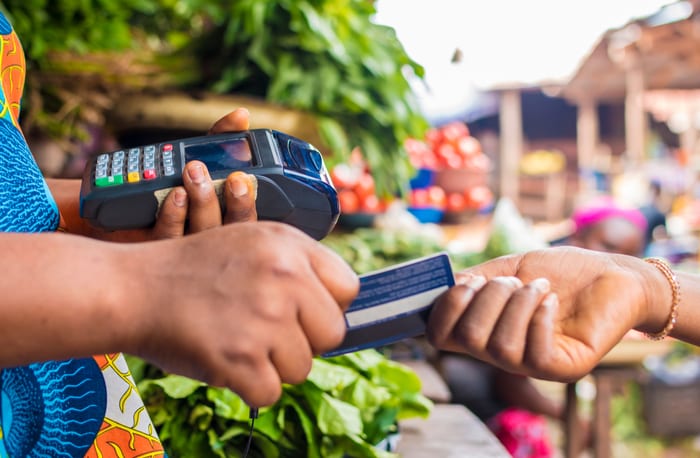Financial inclusion is still a challenge on the continent. Yet Africa’s fintech is poised to be the fastest growing in the world this decade, but more needs to be done to achieve this acclaim.
Africa’s ascent as the global frontrunner in the fintech industry is undeniable. Per a recent report by Boston Consulting Group (BCG) and QED Investors, the continent’s fintech ecosystem is poised to be one of the fastest growing by 2030. According to the BCG-QED Investors Global Fintech report, Asia-Pacific regions will be the largest fintech market by 2030, while Latin America and Africa will be the fastest-growing regions in that market. Fintech revenue is projected to grow by 13x on the continent. However, as this remarkable growth takes shape, it becomes crucial to critically examine the potential costs and implications that accompany this transformative journey.
Africa has the leading population of unbanked and underbanked people globally. According to World Bank, 57% of Africans are unbanked. With cash still being king in Africa, BCG’s Rishi Varma, coauthor of the Global Fintech report, believes fintech could be a vehicle to solve the access issue and promote financial inclusion.
While financial inclusion might be a top priority for the fintech landscape, Eghosa Omoigui, an early-stage VC investor, believes that African fintech startups must build products that truly meet the needs of Africans. “The projected growth of Africa’s fintech won’t happen without the adoption of fintech products, and there can be no adoption without building products that have empathy and understanding. One is tied to the hip of the other,” he explained.
Varma believes that for the anticipated growth to happen, African fintech would need to “leapfrog” incumbent fintech with the adoption of new technologies. “We expect some degree of leapfrogging in technology, particularly when it comes to cashless payments,” he shared. For Omoigui, he is convinced that for the projected growth of Africa’s fintech to occur, the space needs a decent match of high conviction and high-integrity founders and investors that are willing to bet the long game.
Fintech expansion will aid more digital infrastructure in Africa
Varma believes that to accomplish large digital infrastructure growth in Africa’s fintech, local incumbent financial institutions and telcom providers need to continue to leverage their influence. He believes this partnership between fintech and financial institutions will advocate for greater innovation and entrepreneurship that will help accelerate, expand, and strengthen local African economies and improve quality of life.
Omoigui said that the projected growth provides a new pathway for African fintech to dominate digital infrastructure in Africa. According to him, the lack of optionality for regular banks will help new fintech companies to build trusted brands.
Benoit Delestre, chairman at Africa-focused VC firm, Saviu Ventures, echoes the same sentiment, he believes that in the coming days, fintech in Africa will cater for the large population of people that the banks are currently not serving. “The traditional banks only reach 5-10% of the population, fintechs are needed to cater for the remaining 90%,” he said on a call with TechCabal.
Regulations
While regulation might be might a drawback in achieving Africa’s projected fintech growth, Varma believes that African countries need to create an environment that fosters innovation and encourages investment flows.
“There needs to be a clear call to action for country regulators to create an environment that fosters innovation, promotes financial inclusion and encourages fund/investment flows. This could attract institutional investors (incl. venture capitalist firms) that are willing to invest and back local entrepreneurs to launch financial products and solutions (payments, remittance and lending) for local consumers and businesses.“
Varma expects the ‘big four’ to take a cue from leading emerging markets like India, Brazil, and Mexico which have developed regulatory policies to support the fintech ecosystem growth in their countries.
“We expect major African economies of South Africa, Nigeria, Egypt and Kenya to take inspiration from leading emerging market economies like India, Brazil, Mexico that have been quite advanced in developing regulatory policies that promote development of public digital financial infrastructure that have created easy, secure access and lowered the cost of transactions,” he shared with TechCabal. “This has directly contributed to building consumer trust and supported the growth of fintech companies,” he said. “As fintechs gain scale they have the potential to be one catalyst for the creation of at-scale digital and data infrastructure in Africa.”
Investment opportunities for projected growth
Ashim Egunjobi, a VC investor, is of the view that the expected growth of fintech in Africa will happen in a profitable way and that indigenous investors will be major frontiers. “You know, the early stage fintech sector has very much benefited from capital deployed by global fund managers but what you see now is the rise of emerging fund managers that are, in fact, local. They are savvy with regards to understanding the drivers of scale, they are understanding the regulatory environment and the time investment and effort investment required with regards to those regulatory and players,” she said.
Egunjobi’s view is that new investment opportunities exist for both local and international investors in the B2B and B2B2C fintech models while also noting that new emerging technologies like AI and machine learning are a driving wave for fintechs.
“The inclusion of these types of innovative technologies in fintech solutions are really going to help, you know, have unique selling propositions, but also really have real customer value propositions,” she told TechCabal. “‘How do we use these data points from AI to inform the regulators? ‘How do we use these data points to inform fintech founders with regards to, proactively being able to assess risk to understand customer behaviour to understand the product better?’”
“Also, you know, being able to say, ‘how do we make certain things more efficient?’, How do we embed, artificial intelligence into some of our products —not just in the way we build them, but even in the customer experience? And really making the experience, you know, quick and more efficient,“ Egunjobi added.






















